1 April 2020 : Home learning
Happy April Fools Day!
We are in the fourth month of 2020 already! Sing the months of the year song – https://youtu.be/JABPMyXTZcs
Maths – addition using part whole models
We use part whole models to help us represent number stories and calculations. From a part whole model, a ‘fact family’ can be created. These are calculations that are closely related and match the part whole model. There is an example below.
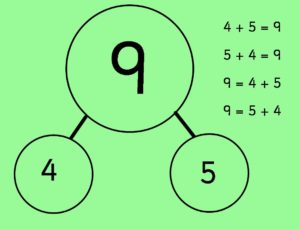
Look at the other part whole models, copy them into your home learning book and write the addition fact families to go with them.
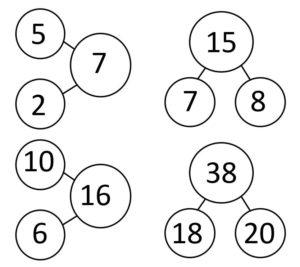
Challenge : Draw your own part whole model and write the addition fact family to go with it.
Reading – phonics
Copy the questions below into your home learning book. Add sound buttons to the words that you need to sound out (your child should know what these are and there is an example below). Write yes or no to answer them.

Can a boat sail?
Would you scream if you saw a snake?
Has a frog got sharp claws?
Challenge : Think of some more yes/no questions of your own.
Topic – jokes!
It’s April Fools Day. Tell some jokes to your family. Here are some ideas or you could find/tell some of your own.
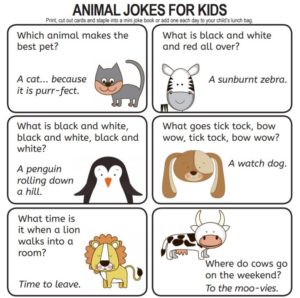
1 April 2020: Home Learning
Hi children,
How are you all? Have you been making the time to exercise?
Whether you are practising your football skills, skipping, hula hooping, running or following Joe Wicks every day, keep going! Let us know what you have been doing to keep both physically and mentally fit!
Enjoy your learning tasks for the day.
Topic / Reading
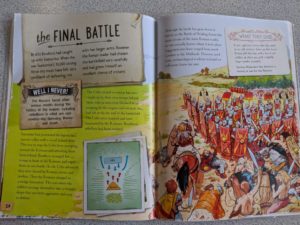
- Before the start of the battle, why would Boudicca have been confident of winning?
- What slowed down the Celts movement towards the Romans?
- Why has the author included a diagram on page 24?
- What stopped the Celts from getting away from the Romans?
- What does the word rebellion mean? Use a dictionary or the internet to find out if you’re not sure.
- Whereabouts in England did the Battle of Watling Street happen?
Maths
Y3 – bus stop division Y3 – grid method ANSWERS
Y4 – column method, grid method ANSWERS Y4 – x and division (2)
Creative writing – descriptions
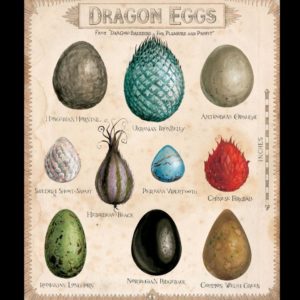
Describe an egg, using adjectives, and see if a partner can guess it.
Which dragon do you think is the most dangerous? Why?
Which dragon do you think will be the friendliest? Why?
Which species could survive in cold temperatures? How do you know?
Which dragon egg would you like to find and why?
What would you do if you came across a Norwegian Ridgeback egg? Write a what-to-do-if…guide.
Try drawing what you think each species will look like as a fully grown dragon; use details from the egg’s appearance and the species name to inform your choices.
Extra: Create ‘Top Trumps’ cards for each species. Decide on the categories and give them ratings, then do battle!
challenge:
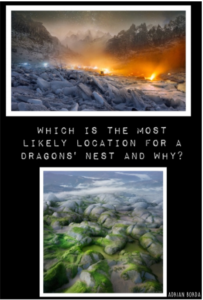
01 April 2020: Home learning
Good morning everyone!
I hope you all had a good night’s sleep and are keen to get on with your learning today.
Here’s today’s learning…
Year 5 Maths Task
Answers from yesterday:
- 1,2,3,6,9,18
- 1,2,3,4,6,8,12,24
- 15
- 1,2,4,8
- 8
- 1,3,7,21
- 1,2,3,4,6,9,12,18,36
- 1 and 3
Challenge: False. For example, 12 has 6 factors but 13 only has 2.
Starter
Create some 5-digit column addition calculations and answer them.
Your learning today is squared numbers.
This is an array showing 3 x 3 = 9.

- How many different arrays can you create using 36 counters? Draw them and write the corresponding multiplication sums.
- What are the first 12 squared numbers? (when you multiply a number by itself)
Challenge
Always, Sometimes, Never
A square number has an even number of factors.
Year 6 Maths Task
Answers from yesterday:
There are the two solutions:
13 chocolate bars and 9 fruit bars
4 chocolate bars and 22 fruit bars
Solve the challenge in your exercise book.

Writing task (Y5,6)
Our learning is expanded noun phrases.
Your task today is to write an email to a loved one – perhaps a family member, friend or teacher. Your email can consist of anything you wish – it could be full of things that you have been doing at home to stay active and healthy, for example.
In this email, you must include expanded noun phrases. Here is a short example of an email.
Dear Jane,
I hope you are enjoying the roasting sunshine! My sister and I have been playing in the garden with our fluffy dog, Rosie. We have also been joining in with Joe Wicks PE sessions every morning. Thanks for sending me a beautiful birthday card – it really made me smile.
I look forward to hearing back from you.
Billy
Reading task (Y5,6)
Your learning today is a little bit different to normal. Today, we’d like you to just enjoy reading. Your task is to read the FirstNews newspaper (it will open as a separate page in your browser when you click the link). You should spend about 30 – 40 minutes reading it.
We’re not expecting you to do any learning in your exercise books today as the main thing we want you to do is to enjoy reading. However, if you like, you could complete one (or more) of the following tasks…
- Read the paper with someone in your house and discuss the articles you’ve read.
- Do the same as above but with a friend from school over the phone.
- Respond creatively to one of the articles you’ve read (a bit like a creative homework).
- Interview someone in your house, or someone over the phone, and write your own news article about what you find out.
31 March 2020 : Home learning
Good morning!
Keep going with reading, spellings and times tables every day.
Maths
Warm up by singing the big numbers song – https://youtu.be/e0dJWfQHF8Y
There are some numbers missing from this part of the 100 square. Copy it and fill in the missing numbers.

Challenge :

Reading
Read a story book. Write three questions that you would like to ask one of the characters. Remember to use a capital letter, finger spaces and a question mark. For example –
How did you feel when you found Goldilocks in your house?

Topic – History
We have been learning about chronology in the last few weeks, putting toys in chronological order. Look at the toys timeline we created last week. Talk about what the timeline shows using the words below.

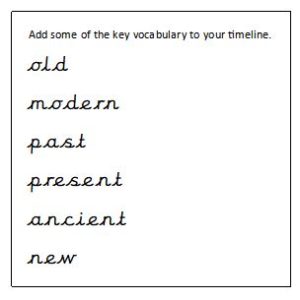
Challenge : Choose 3 or 4 of your own toys. Put them in chronological order of when you got them.
31 March 2020: Home Learning
Happy Tuesday everyone!
Here are your activities for today. Here’s a routine to help you structure your day Home Learning Routine. Have lots of fun and remember to keep up with your reading and times tables too!
Happy learning !
Team 3,4
Reading:
Maths (and answers from yesterday)
Y4 – column method, grid method
Topic
In history lessons this half-term, we have answered all of the following questions.
- When did the Romans successfully invade Britain?
- Who was the emperor during the first successful invasion?
- Why did the Romans invade Britain?
- Was Boudicca a Roman or a Celt?
- What was the name of Boudicca’s tribe?
- How did Boudicca die?
First of all, we’d like your child to answer the questions. If there are any questions they don’t remember the answer to, they can use the internet to find them. A couple of links below:
https://www.bbc.co.uk/bitesize/topics/zqtf34j
http://www.primaryhomeworkhelp.co.uk/Romans.html
Next, they should show off some of the knowledge they’ve learnt in the topic in a poster. This could be some of the answers to the questions above or other things they’ve learnt. Email some pictures of the posters you create and I’ll post them on Class News!
31 March 2020: Home learning
Before we get into the tasks for today, remember to keep your TTR skills honed by logging on and playing for 15 minutes. Also, keep reading for at least 15 minutes a day. Remember: The more that you read, the more things you will know. The more you learn, the more places you’ll go – Dr Seuss.
Here’s today’s learning…
Year 5 maths task
Answers from yesterday:
- 7,14,21,28,35,42,49,56,63,70.
- 21
- 56
- 6,12,18,24,30,36,42,48,54,60.
- 2,9
- 5,6
- 2,3,4,6,8,12
Challenge: Eva is 21.
Starter
Times Tables Rockstars- improve your multiplication skills.
Your learning today is factors.
Factors- a pair of numbers we multiply together to get another number. For example: factors of 6 include 3×2.
- Find all the factors of 18.
- Find all the factors of 24.
Fill in the blanks.
- 1, 3, 5 and 15 are factors of the number_____.
- The factors of the number 8 are __________.
- The number 42 has _____ factors.
- List the factors of 21.
- List the factors of 36.
- What are the common factors of 21 and 36?
Challenge
True or false?
The bigger the number, the more factors it has.
Year 6 maths task
Here are the answers from yesterday: Y6 FourOperations A Answers
Solve puzzles
Chocolate bars cost 26p
Fruit bars cost 18p
Jack spent exactly £5 on a mixture of chocolate bars and fruit bars.
How many of each did he buy?
Challenge: How many different solutions can you find? How do you know you’ve found them all?
Writing task
We are continuing with expanded noun phrases as our learning.
Your task today is to draw and label a Viking. This picture must be accurate (don’t have your Viking character holding an iPhone!) Around this picture, you must label features and equipment that your Viking has, using expanded noun phrases.
Here is an example of some expanded noun phrases for a Viking.
a large, round shield
the glistening, silver sword
his ragged, curly beard
the powerful Jarl
Tip: Remember, a Jarl is a Viking village leader.
Challenge: Can you use some of the following vocabulary in your labelling?
Jarl Longhouse sheath
It would be fantastic to see some of these images, so that we can post them on the school website! Please email your finished pieces to your teachers.
Reading task
Answers from yesterday – see the attached document. The answers are on pages 6, 7 and 8.
comprehension answers to Monday’s task
Your learning today is a debate.
Read this information from First News
It’s all about whether the government should do more to reduce food waste. Debates are a great way to engage with the world around us and allow us to think about our own opinions. There’s a lot of information so don’t feel you need to read it all – you should read at least 3 pages though.
Once you’ve read the information, think about some reasons ‘for’ and ‘against’. Set it out like this…
‘Should the government do more to reduce food waste?’
| for | against |
For challenge, choose one (or more) of the things below to do:
Optional challenge 1: find someone in your house to talk to about this issue. Impress them with your new knowledge and give them your opinion. Then, ask them for theirs. If you disagree, why not debate it?
Optional challenge 2: do the same as above but with a friend from school on the phone – we’d love it everyone did this challenge!
Optional challenge 3: imagine you’ve been asked by the prime minister (Boris Johnson) to encourage the public to reduce food waste. Using information from the text, you must convince them to do so. You could do this however you like but here’s some ides…
- Create a poster.
- Write a letter.
- Design a leaflet to be posted through letterboxes.
- Make a video explaining why it’s important – it could go viral!
Reading at home
We have had a few emails asking what to do when children have finished reading their school reading books.
Any books you read at home will be fine; story books, comics, magazines, dictionaries, atlases, chapter books, recipes or lists. The children don’t need to be able to read every single word independently. You can read to them, take turns, look for words they can read and talk about the book.
There are also lots of e books on Twinkl for free, ranging from traditional tales to information texts – https://www.twinkl.co.uk/resources/literacy/reading/reading-ebooks
Just keep reading!
30 March 2020: Home learning
Hello year 5/6. We hope you’ve had a relaxing weekend and you’re recharged and ready for another great week of home learning.
Firstly, thanks to all the children who responded to the teacher’s plea of getting in touch on Friday. It was great to hear from you. Don’t forget to keep sending us your fantastic learning/ activities so we can post them on the class news page. It would also be great to see what else you’ve been doing at home. It might inspire other families to do the same.
Here’s today’s learning…
Year 5 maths task
Answers from Friday:
I’m thinking of a number. The number was 4596.
- 9,485 + 352 – 5241= 4596
- 8,947 + 8,521 = 17,468
Challenge
Bottom row- 3,804, 5,005
2nd row- 8118
3rd row- 15,094, 13,391
4th row- 28,485, 27,422
Starter
Write down all the multiples of 5 between 30 and 60.
For example: a multiple of 3 is 6, 9 and 12 etc.
Your learning today is multiples.
1.Write down the first ten multiples of 7.
2.What is the third multiple of 7?
3.What is the eighth multiple of 7?
4.Write down the first ten multiples of 6.
Fill in the blanks.
5.The third multiple of 6 is also a multiple of___________.
6.The tenth multiple of 3 is also a multiple of __________.
7.The multiple of a number is 24. What could the number be?
Challenge
Eva’s age is a multiple of 7 and is 3 less than a multiple of 8.
She is younger than 40.
How old is Eva?
Year 6 maths task
Write the answers to the questions below in your exercise book.
Challenge: Write your own word problem, which is similar to question 9.
Writing task
This week’s learning is expanded noun phrases.
An expanded noun phrase is where an adjective is added to a noun to provide more information/description: ‘the table’ could be made into ‘the wooden table’.
Your task today is to convert the following nouns into expanded noun phrases.
boat garden Caliph lightening music
Tip: Remember, a Caliph is an ancient Islamic ruler!
Challenge: Can you create three of your own sentences with expanded noun phrases in them?
Reading task
Your learning today is a comprehension task.
You should read the FirstNews task (it will open as a separate page in your browser when you click the link). Once you’ve read it, answer the questions on page 2 – these questions will help you practice a range of reading skills.
Challenge 1: create your own questions for someone else to answer.
Challenge 2: ask someone in your house to help – they’ll need to be able to read so maybe not your pet dog or your favourite teddy bear. One of you is going to play the role of a ‘journalist’. The other person will play the role of an ‘expert’. The journalist should ask the expert questions that they can answer using the text. The expert uses the text to answer them. You could swap roles, too. Why not go BIG and put on a different voice, dress up or use a hairbrush as a microphone. You could even film it and send it in to us!
30 March 2020 : Home learning
Good morning everyone! It is Monday again, so here are some new spellings and times tables to use throughout the week. Remember to keep reading every day too.
Y1 spellings
- she
- so
- some
- there
- their
- they
- to
- today
Y2 spellings
- every
- everybody
- eye
- fast
- father
- find
- floor
- gold
- grass
- great
Times tables for this week is the times 5 facts and divide 5 facts (for Y2s) and counting forwards and backwards in 5s (for Y1s).
Maths
Sing along with the counting in 3s song – https://youtu.be/V96IZWctZYA
Copy and compete the number patterns.
0, 2, 4, 6, …., 10, …., 14, …., ….
0, 5, …., 15, …., …., 30, …., ….
0, 10, 20, 30, …., …., …., 70, ….
0, 3, 6, 9, …., 15, …., …., 24
Challenge :
16, 14, 12, …., …., 6, …., 2, 0
50, 45, 40, …., 30, …., 20, ….
100, 90, 80, …., …., …., …., ….
24, 21, …., 15, …., 9, …., 3, 0
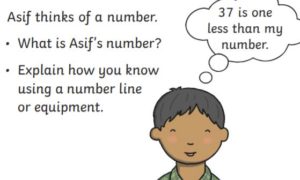
Challenge : Make your own ‘Guess my number’.
Reading
Read the ‘Hide and Seek’ text and answer the questions in your home learning book.
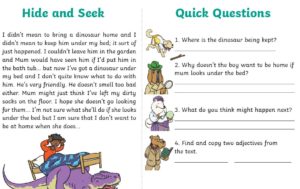
You can also use the text as ‘reading fluency’. We do this every day at school, reading the same text each day. The aim is to develop fluency and expression when reading. Each day we would focus on a different aspect of the text eg vocabulary (what do the words mean), punctuation (taking note of commas, full stops) and tricky spellings. By the end of year 2, children are expected to be reading approximately 90 words per minute.
Topic : Geography
Watch and sing along with the continents song – https://www.youtube.com/watch?v=K6DSMZ8b3LE
Write a list of all the continents. Remember that proper nouns begin with a capital letter (names of continents).
If you have a globe or atlas, you could try to find them on there too.
30 March 2020: Home Learning
Hi children and welcome to Week 2 of Home Learning.
We hope that you have had a lovely weekend and have managed to do some
interesting activities!
Check out these ways to Keep Fit At Home. There is something for everyone with a Gold, Silver and Bronze challenge bingo board to complete!
We have given you a list of spellings to practise this week – you could ask an
adult to test you on Friday. In addition to your daily tasks, please keep up the daily reading and times table practise too.If you haven’t already looked at the class news section of the website, then please do. You may see a few familiar faces and enjoy listening to our messages.
Please keep in touch – we really do enjoy hearing from you.
Happy learning! Happy Monday!
Team 3,4
Spelling.
accident(ally)
actual(ly)
address
answer
appear
arrive
believe
bicycle
breath
breathe
How many ways can you practise these spellings?
Examples:
- rainbow words – each letter is written in a different colour
- split each word into syllables en/joy/ment
- box words – draw a box around each letter in the word
- pyramid words
- look, cover, spell, check
Maths
Y3 – multiplication and division assessment
Y4 – multiplication and division assessment
Reading
Writing
Watch the film clip of ‘The Present’.
What is the story here? Rewrite it.
Think about:
- How does the puppy help the boy?
- How is the boy different at the start and at the end of the clip?
- How are they good for each other?
- What do you think happened to the boy?
Happy learning!